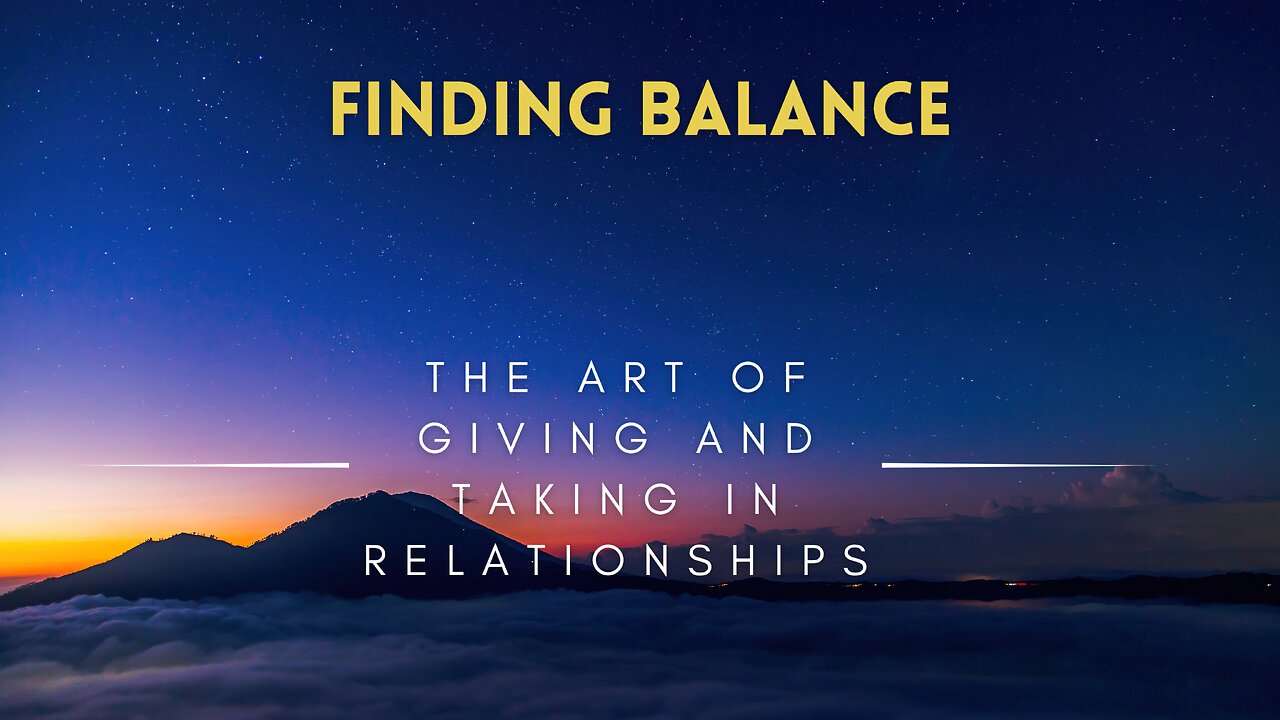Premium Only Content

12 - Finding Balance - The Art of Giving and Taking in Relationships
In this episode "Finding Balance: The Art of Giving and Taking in Relationships," we delve into the intricacies of generosity in interpersonal connections. We reflect on the differing degrees of giving, while acknowledging the unique circumstances and limitations everyone has. This discussion is an examination of the importance of empathy, understanding, and the significance of maintaining a balance between giving and taking. We also explore potential signs of imbalance in a relationship and the steps to take when a relationship is not feeling mutually fulfilling.
#relationships #giving #taking #balance #empathy #generosity #emotionalhealth #interpersonalrelationships #relationshipadvice #communication #settingboundaries #relationshipevaluation
References for Further Reading:
Allen, S. (2018). The Science of Generosity (p. 81) [White Paper]. University of California, Berkeley. https://ggsc.berkeley.edu/images/uploads/GGSC-JTF_White_Paper-Generosity-FINAL.pdf
Angelou, M. (2013). Mom & Me & Mom. Random House.
Batson, C. D. (2009). These Things Called Empathy: Eight Related but Distinct Phenomena. In J. Decety & W. Ickes (Eds.), The Social Neuroscience of Empathy (pp. 3–16). The MIT Press. https://doi.org/10.7551/mitpress/9780262012973.003.0002
Borelli, J. L., Nelson, S. K., River, L. M., Birken, S. A., & Moss-Racusin, C. (2017). Gender Differences in Work-Family Guilt in Parents of Young Children. Sex Roles, 76(5–6), 356–368. https://doi.org/10.1007/s11199-016-0579-0
Brown, B. (2018). Dare to Lead: Brave Work. Tough Conversations. Whole Hearts. Random House.
Chapman, G. (2015). The 5 Love Languages: The Secret to Love that Lasts (Reprint edition). Northfield Publishing.
Clark, M. S., & Mills, J. R. (2012). A Theory of Communal (and Exchange) Relationships. In P. Van Lange, A. Kruglanski, & E. Higgins, Handbook of Theories of Social Psychology (pp. 232–250). SAGE Publications Ltd. https://doi.org/10.4135/9781446249222.n38
Dainton, M., & Aylor, B. (2001). A relational uncertainty analysis of jealousy, trust, and maintenance in long‐distance versus geographically close relationships. Communication Quarterly, 49(2), 172–188. https://doi.org/10.1080/01463370109385624
Damasio, A. (2005). Descartes’ Error: Emotion, Reason, and the Human Brain (Reprint edition). Penguin Books.
Davis, M. H. (1983). Measuring individual differences in empathy: Evidence for a multidimensional approach. Journal of Personality and Social Psychology, 44(1), 113–126. https://doi.org/10.1037/0022-3514.44.1.113
Deci, E. L., & Ryan, R. M. (2000). The “What” and “Why” of Goal Pursuits: Human Needs and the Self-Determination of Behavior. Psychological Inquiry, 11(4), 227–268. https://doi.org/10.1207/S15327965PLI1104_01
Demir, M., Orthel-Clark, H., Özdemir, M., & Bayram Özdemir, S. (2015). Friendship and Happiness Among Young Adults. In M. Demir (Ed.), Friendship and Happiness (pp. 117–135). Springer Netherlands. https://doi.org/10.1007/978-94-017-9603-3_7
Dunbar, R., & Brookes, E. (2016). The Science of Love and Betrayal (Unabridged edition). Audible Studios on Brilliance Audio.
Dunn, E. W., Aknin, L. B., & Norton, M. I. (2008). Spending Money on Others Promotes Happiness. Science, 319(5870), 1687–1688. https://doi.org/10.1126/science.1150952
Floyd, K. (2008). Communicating Affection: Interpersonal Behavior and Social Context (1st edition). Cambridge University Press.
Fredrickson, B. L. (2001). The role of positive emotions in positive psychology: The broaden-and-build theory of positive emotions. American Psychologist, 56(3), 218–226. https://doi.org/10.1037/0003-066X.56.3.218
Gable, S. L., Reis, H. T., Impett, E. A., & Asher, E. R. (2004). What Do You Do When Things Go Right? The Intrapersonal and Interpersonal Benefits of Sharing Positive Events. Journal of Personality and Social Psychology, 87(2), 228–245. https://doi.org/10.1037/0022-3514.87.2.228
García Mendoza, M. D. C., Sánchez Queija, I., & Parra Jiménez, Á. (2019). The Role of Parents in Emerging Adults’ Psychological Well‐Being: A Person‐Oriented Approach. Family Process, 58(4), 954–971. https://doi.org/10.1111/famp.12388
Gottman, J., & Silver, N. (2015). The Seven Principles for Making Marriage Work: A Practical Guide from the Country’s Foremost Relationship Expert (Revised ed. edition). Harmony.
Gouldner, A. W. (1960). The Norm of Reciprocity: A Preliminary Statement. American Sociological Review, 25(2), 161. https://doi.org/10.2307/2092623
Grant, A. (2014). Give and Take: Why Helping Others Drives Our Success (Reprint edition). Penguin Books.
Impett, E. A., Gable, S. L., & Peplau, L. A. (2005). Giving up and giving in: The costs and benefits of daily sacrifice in intimate relationships. Journal of Personality and Social Psychology, 89(3), 327–344. https://doi.org/10.1037/0022-3514.89.3.327
Jakubiak, B. K., & Feeney, B. C. (2017). Affectionate Touch to Promote Relational, Psychological, and Physical Well-Being in Adulthood: A Theoretical Model and Review of the Research. Personality and Social Psychology Review, 21(3), 228–252. https://doi.org/10.1177/1088868316650307
Kabat-Zinn, J. (2005). Wherever You Go, There You Are: Mindfulness Meditation in Everyday Life (10th edition). Hachette Books.
Knapp, M. L., Hall, J. A., & Horgan, T. G. (2013). Nonverbal Communication in Human Interaction (8th edition). Cengage Learning.
Ko, L. K., & Lewis, M. A. (2011). The role of giving and receiving emotional support in depressive symptomatology among older couples: An application of the actor-partner interdependence model. Journal of Social and Personal Relationships, 28(1), 83–99. https://doi.org/10.1177/0265407510387888
Lambert, N. M., Clark, M. S., Durtschi, J., Fincham, F. D., & Graham, S. M. (2010). Benefits of Expressing Gratitude: Expressing Gratitude to a Partner Changes One’s View of the Relationship. Psychological Science, 21(4), 574–580. https://doi.org/10.1177/0956797610364003
Lebow, J. L., & Snyder, D. K. (Eds.). (2022). Clinical Handbook of Couple Therapy (Sixth edition). The Guilford Press.
Lyubomirsky, S., Sheldon, K. M., & Schkade, D. (2005). Pursuing Happiness: The Architecture of Sustainable Change. Review of General Psychology, 9(2), 111–131. https://doi.org/10.1037/1089-2680.9.2.111
Ma, L. K., Tunney, R. J., & Ferguson, E. (2017). Does gratitude enhance prosociality?: A meta-analytic review. Psychological Bulletin, 143(6), 601–635. https://doi.org/10.1037/bul0000103
Miller, J. (n.d.). Boundaries: How to Draw the Line in Your Head, Heart, and Home.
Neto, F. (2017). Satisfaction With Love Life Scale [dataset]. https://doi.org/10.1037/t62605-000
Newson, M., Buhrmester, M., & Whitehouse, H. (2016). Explaining Lifelong Loyalty: The Role of Identity Fusion and Self-Shaping Group Events. PLOS ONE, 11(8), e0160427. https://doi.org/10.1371/journal.pone.0160427
Post, S. G. (2005). Altruism, happiness, and health: It’s good to be good. International Journal of Behavioral Medicine, 12(2), 66–77. https://doi.org/10.1207/s15327558ijbm1202_4
Poulin, M. J., Brown, S. L., Ubel, P. A., Smith, D. M., Jankovic, A., & Langa, K. M. (2010). Does a helping hand mean a heavy heart? Helping behavior and well-being among spouse caregivers. Psychology and Aging, 25(1), 108–117. https://doi.org/10.1037/a0018064
Reis, H. T., Clark, M. S., & Holmes, J. G. (2004). Perceived Partner Responsiveness as an Organizing Construct in the Study of Intimacy and Closeness. In Handbook of closeness and intimacy. (pp. 201–225). Lawrence Erlbaum Associates Publishers.
Rhoades, G. K., Stanley, S. M., & Markman, H. J. (2012). A Longitudinal Investigation of Commitment Dynamics in Cohabiting Relationships. Journal of Family Issues, 33(3), 369–390. https://doi.org/10.1177/0192513X11420940
Rusbult, C. E., & Van Lange, P. A. M. (2008). Why We Need Interdependence Theory. Social and Personality Psychology Compass, 2(5), 2049–2070. https://doi.org/10.1111/j.1751-9004.2008.00147.x
Schaufeli, W. B., Leiter, M. P., & Maslach, C. (2009). Burnout: 35 years of research and practice. Career Development International, 14(3), 204–220. https://doi.org/10.1108/13620430910966406
Stanley, S. M., Amato, P. R., Johnson, C. A., & Markman, H. J. (2006). Premarital education, marital quality, and marital stability: Findings from a large, random household survey. Journal of Family Psychology, 20(1), 117–126. https://doi.org/10.1037/0893-3200.20.1.117
Triandis, H. C. (1995). Individualism And Collectivism (1st edition). Routledge.
Twenge, J. M., & Campbell, W. K. (2010). The Narcissism Epidemic: Living in the Age of Entitlement (unknown edition). Atria.
Weger, H., Castle, G. R., & Emmett, M. C. (2010). Active Listening in Peer Interviews: The Influence of Message Paraphrasing on Perceptions of Listening Skill. International Journal of Listening, 24(1), 34–49. https://doi.org/10.1080/10904010903466311
-
 LIVE
LIVE
Wendy Bell Radio
6 hours ago9 Steps Ahead
12,943 watching -
 LIVE
LIVE
LFA TV
14 hours agoTIME FOR A NEW SPEAKER! | LIVE FROM AMERICA 12.26.24 11am EST
1,227 watching -
 1:40:22
1:40:22
Game On!
11 hours ago $2.08 earnedNFL Thursday Night Football Seahawks at Bears EXPERT Picks!
14.3K4 -
 LIVE
LIVE
xBuRnTx
1 hour agoWho's Ready for New Years!
198 watching -
 12:09
12:09
Tactical Advisor
13 hours agoSmith & Wesson Shield Plus Carry Comp
1.41K1 -
 4:35:25
4:35:25
Father Russell
6 hours agoDelta Force | Not A Woman? | Mad Martigan Time
38.5K1 -
 3:29:42
3:29:42
BrookieMonster
13 hours ago $43.52 earnedChristmas Stream: Marvel Rivals with CallmeSeags 🎄
164K29 -
 LIVE
LIVE
TheSaf3Hav3n
3 days ago| RUMBLES FIRST SUBATHON IS HERE!!! | DAY 4 |
503 watching -
 6:54
6:54
Dr. Nick Zyrowski
1 hour agoHIGH PROTEIN DIET Fixes Your Metabolism! - Weight Loss Not Required
8.01K5 -
 3:14:33
3:14:33
Joe Donuts Gaming
15 hours ago🟢 Live : Christmas is Here!! | Fortnite, Caroling, Light Tours and Donos !!
87.2K15